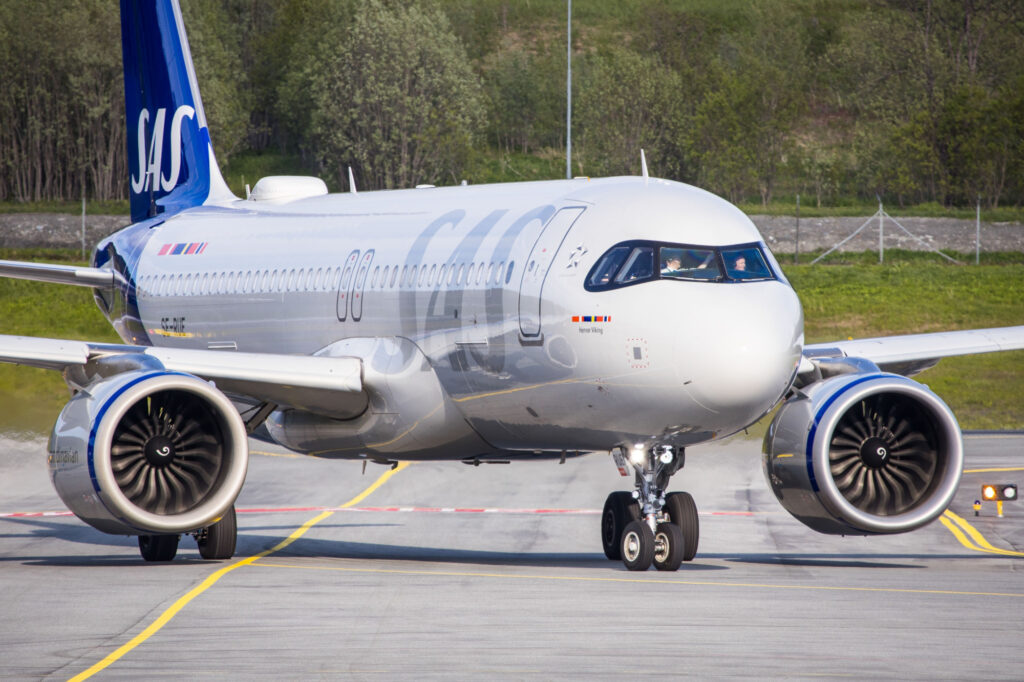At a press conference ahead of the official inauguration of the 2024 IATA AGM, which is taking place in Dubai, June 2-4, 2024, the CEOs of SkyTeam, Patrick Roux, and SAS, Anko van der Werff, held a joint press conference to brief on the accession of the Scandinavian airline to the alliance.
SAS, a founding member of Star Alliance, will officially join SkyTeam on September 1, 2024, completing the realignment that followed Air France-KLM’s completion of an equity investment.
This is the first time a founding member of one of the major alliances has switched allegiance. Both CEOs highlighted the swiftness of SAS’s integration into SkyTeam. Joining one of the alliances typically takes 18 to 24 months.
Roux explained that joining an airline is a sequential process in which a number of steps must be completed, particularly in relation to IT systems. It is often not possible to work on them in parallel since each depends on the successful implementation of the preceding one. This means that there are bottlenecks that slow down the process.
In this case, however, both airline executives agreed that the expertise accumulated by the SAS teams, which are already familiar with the inner workings of a major airline, has streamlined much of the process.
Van der Werff highlighted that SAS brings to SkyTeam the 8 million members of its Eurobonus loyalty program and a strong presence in Scandinavia, whose population, while relatively small, has relatively high-income levels and a propensity to travel.
Asia remains a difficult market for SAS due to the closure of Russian airspace. While the airline has reintroduced some services to the region, Van der Werff explained that the rerouting has added 3 to 3.5 hours of flight time, which makes it rather difficult to be competitive with the added fuel consumption.
Thus, the North Atlantic market remains SAS’s main long-haul market, particularly with the possibilities offered, primarily, by cooperation with SkyTeam partner Delta Airlines and Air France-KLM. SAS’ CEO also mentioned that the carrier may soon announce its cooperation with other partners in this market.
In this regard, however, the SAS CEO pointed out that, while the airline had toyed in the past with the launch of some US routes from Nordic secondary airports, long-haul activity will remain clustered at SAS hubs, mostly Copenhagen (CPH). This doesn’t preclude exploring some options to return to smaller airports in cooperation with partners in the future.
Van der Werff did not rule out entering new long-haul markets, such as Latin America, a region he said he has particular appreciation. [Before joining SAS, Van der Werff held senior executive positions at both Avianca and Aeromexico – ed. note].
The ongoing restructuring of the business was also discussed at the conference. Van der Werff confirmed that the US part of this process, overseen by a US judge, is almost completed and could be closed this summer.
Regarding European regulators, Van der Werff expressed his hope that the Air France-KLM tie-up will be approved. He pointed out that the authorities will understand that, despite their links, Air France-KLM and SAS will remain competitors on those routes to and from Scandinavia, where they both have services.
Recent financial difficulties have not prevented SAS from continuing to invest in sustainability. Van der Werff confirmed the carrier’s ongoing support for Swedish hybrid-electric aircraft developer Heart Aerospace, a company SAS has invested in. He explained how SAS feedback had helped the startup pivot to a larger aircraft concept and switch from pure electric to hybrid electric propulsion.
Van der Werff is keen to see more ideas being explored in the field of sustainability and is also cooperating with Airbus in the ZEROe program, which aims to develop a hydrogen-powered airliner. In response to journalists’ questions, the airline executive expressed confidence that investors had factored in these sustainability investment commitments when evaluating the airline’s restructuring plans.

